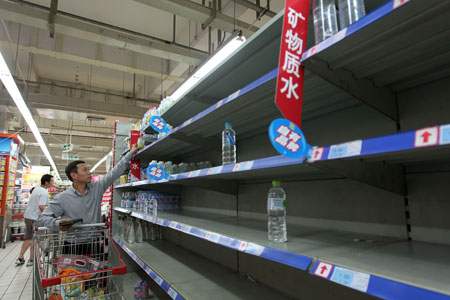Hangzhou acid spill sparks panic water buying
A round of panic buying of mineral water swept the city of Hangzhou, east China's Zhejinag Province, on Monday after a highway accident saw 20 tons of a toxic chemical flood a nearby river, affecting the drinking water supply of hundreds of thousands of residents.
 |
|
A shopper in Hangzhou, Zhejiang Province grabs a bottle of mineral water on July 6, 2011 after a chemical spillage threatened the city's water supply. |
The accident happened at 11 pm Saturday when a truck carrying 31 tons of carbolic acid was hit by another heavy lorry. The crash punctured a large hole in its tank, causing the chemical to leak out and be washed into the river by heavy rains.
The Xin'an River, a tributary of the Fuchun and Qiantang rivers, is the main source of drinking water for several cities in Zhejiang, including Hangzhou, the Xinhua News Agency reported.
Lao Xinxiang, a spokesman of the Hangzhou Environment Protection Bureau, told reporters on Monday that five water utility companies in the city had been ordered to stop drawing water from the Xin'an, affecting 552,200 residents.
Eight monitoring stations have been set up along the river to verify levels of toxicity and to keep the government's website updated with the latest data. As of 6 pm on Monday, carbolic acid detected near the accident spot had dropped off to 4.69 milligrams per liter from 100 at 5:30 am Sunday, while data at the furthest monitoring station from the accident spot is 0.0004 milligram per liter.
The maximum safe level of carbolic acid in drinking water sources is set at 0.005 milligram per liter.
"The acid has been greatly diluted in the water, and the current level will cause little harm to people," Hao said, referring to the increased discharge at the Xin'an River dam that is trying to rapidly dilute the spill.
However, caution dictates that it is better to maintain the river off-limits for drinking water until the spill has been fully washed out to sea, Hao added.
Authorities have issued emergency notices asking local residents to store water for daily usage.
Wang Wenwen, an office worker living in Fuyang, near Hangzhou, said that the tap water supply had been suspended since on Monday afternoon and that no information had been given as to when it would be restored.
"My parents will go back to the countryside tomorrow as it is really inconvenient here without water supply," Wang said.
Some residents have begun panic buying bottled water.
"The buying frenzy started in the afternoon. People came in and left with several boxes of bottles each. Almost all the bottled water has been sold out," said an employee with a Carrefour store in Hangzhou on Monday.
The store had no plans to raise water prices at the moment but was not ruling out the possibility in the future, she said.
Lu Dong, director of the Liaison Department of Hangzhou Wahaha Group, one of China's major mineral water producers, told the China News Service on Monday that the company had received many demands to increase mineral water supply to stores in Hangzhou.
Qiandao Lake, Wahaha's water source in the province, had not been affected by the contamination, the report said.
Xu Yifei, a housewife in the Xiaoshan district of Hangzhou, said that she would not hoard water, even though her friends and relatives had asked her to store some.
"It is not helpful to panic. There are so many people affected, so the government will not wait and do nothing," Wang said, adding that the local government promised to ferry water to residents with water tanks.
A statement by the Hangzhou government said that a special team, including environmental protection, emergency, forestry and water and work safety officials, had been set up to deal with the contamination.
However, some people complained about the slow response from authorities.
"They acted a day late. Besides, the city authorities have not published any suggestions or notices regarding water usage," said Dai Jian, a Hangzhou resident.
Carbolic acid is widely used to make plastics or related materials.
"The chemical is corrosive to and can penetrate skin and cause burns. If the substance was ingested in a high concentration, it would damage organs, such as the kidneys, liver and even the heart," said Hao Fengtong, an occupational disease expert and toxicologist at Beijing Chaoyang Hospital.
 0
0 







Go to Forum >>0 Comments